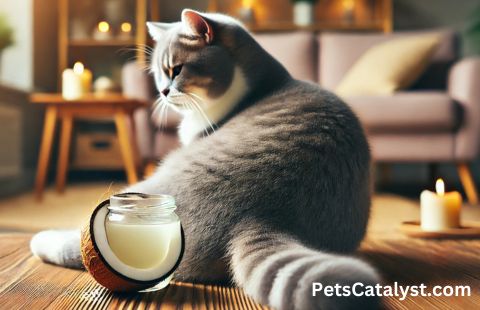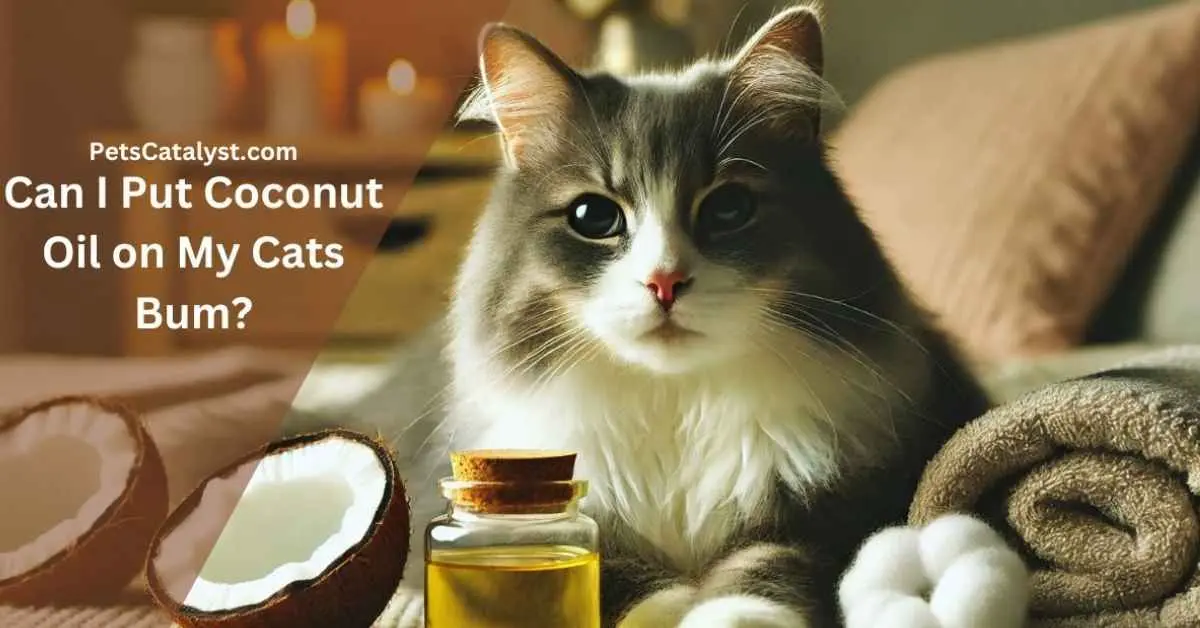Can I Put Coconut Oil on My Cats Bum? If you are a cat lover, this question may pop to your mind if you are dealing with irritation or dry the skin. Coconut oil may seem like a natural solution. But is it actually secure?
As a cat parent (and someone who’s also taking care of two dogs and a turtle), I understand how delicate it can be to care for your pet’s skin. I love my furry friends but sometimes need extra assistance with hygiene needs such as when their bottom hurts.
Understanding the Concern
Why would anyone use coconut oil on their cat’s bum? Our feline friends can experience various uncomfortable issues that could prompt us to look for unusual solutions.

Constipation, anal gland issues or itches can leave our cats feeling uncomfortable. As responsible pet parents, our instinctual goal should be to reduce their discomfort quickly and find an easy fix.
Before trying home remedies for constipation in cats, it’s essential to get to the bottom of things and assess whether your feline really has constipation, or could something more sinister be brewing underneath the surface?
Does your dog or cat need help with his or her anal glands, or is there an infection present that requires attention? Taking the time to understand exactly what’s going on is key for their wellbeing; treating the source rather than simply masking its effects is always best!
The Coconut Oil Craze: Not Just for Humans Anymore
Coconut oil has gained fame in recent years. It is used in cooking and skincare. This practice has also crossed over into the world of pets.
I am a dog owner, and there are times I include little amounts of coconut oil in my dog’s food every now and then. Apparently, it may be a good tactic for treating those pets. It increases in overall coat condition and may even improve bad breath. However, cats have different dietary needs. They are sensitive, particularly regarding digestion.
Some pet owners add a small amount of coconut oil to their cat’s diet for hairball control or coat health. Caution is advised. Coconut oil should not be given excessively or without proper knowledge. Always consult with a veterinarian before introducing any new foods into your pet’s diet.
You May Like to Read:
Can I Put Coconut Oil on My Cats Bum?
Let’s address an often-asked question: Can I Put Coconut Oil on My Cats Bum? The answer may not be as straightforward, however; while its anti-inflammatory and antimicrobial effects could potentially help soothe any irritation on their rear end or address any minor skin conditions or issues, its safety may depend on many other factors as well.
Video Credit: Fast & Curious
Though natural products seem appealing, the truth is that cats are extremely particular about how they groom themselves; any products applied directly to their fur could easily be licked off and eaten!
Although small amounts of coconut oil should not be harmful for cats, excessive intake could result in digestive distress or pancreatitis if consumed in large quantities.
Oiling your cat’s backside could interrupt their natural grooming habits; it may result in matting of fur that traps bacteria and creates further complications – not to mention all the additional mess it would create in your home!
Better Solutions for Your Cat’s Caboose
Before considering the use of coconut oil on your cat’s rear end, it’s crucial to explore veterinarian-approved alternatives for common feline rear-end issues.
If your kitty is experiencing constipation, a small amount of plain canned pumpkin can be beneficial. It’s rich in fiber and can help regulate their digestive system.

To encourage hydration, ensure fresh water is available in several locations around your home. A pet water fountain can also entice your cat to drink more frequently.
For long-haired cats, regular grooming is essential. Frequent brushing and occasional sanitary trims help prevent matting and maintain proper hygiene.
Unscented, pet-safe wipes are an excellent option for quick cleanups without leaving behind any sticky residue.
Sometimes dietary adjustments may be necessary if your cat has persistent digestive problems. Transitioning to a different food might alleviate these issues over time.
Always remember to consult with your veterinarian before introducing any new treatments or making significant changes to your cat’s routine. Our feline companions often have complex health needs that require professional guidance.
When to High-Tail it to the Vet
As a pet owner, it’s natural to want to help your furry friend with home remedies. However, there are specific signs that indicate the need for immediate veterinary attention instead of relying on treatments like coconut oil.
If your cat is experiencing prolonged constipation or diarrhea, it could signal a more serious underlying issue. Similarly, blood in the stool is always a cause for concern and requires prompt assessment by a veterinarian.
Excessive scooting or licking of the rear end can indicate discomfort or an anal gland problem. Swelling or discharge around the anal area also demands professional evaluation to rule out infections or other complications.
Additionally, sudden changes in appetite or behavior may be red flags indicating that your cat is unwell.
As someone who has navigated various pet emergencies (like the time my dog ingested a sock), I emphasize the critical importance of regular veterinary check-ups. Often, these visits allow vets to identify and address health issues early before they escalate into serious problems. Prioritize your pet’s health—when in doubt, consult your veterinarian.
A Purr-sonal Tale
As a devoted pet owner, I want to share an experience that highlights the importance of professional veterinary care. My cat, Whiskers, is usually playful and mischievous. One day, however, I noticed him doing the “booty scoot shuffle” more than usual.
My first instinct was to consider using coconut oil on his bum. After all, it’s a popular home remedy for various issues. But something in my gut told me to pause and take him to the vet instead.
When we arrived at the clinic, the vet conducted a thorough examination. To my relief—and worry—we discovered he had a minor infection that required antibiotics. Had I opted for a DIY approach, like slathering coconut oil on his rear end, I might have masked his symptoms and delayed needed treatment.
This experience taught me a valuable lesson: while it’s tempting to try home remedies, trusting professionals is crucial. They have the training and expertise to handle even the most embarrassing kitty problems!
FAQs
Q: Is it safe for my cat with pancreatitis to have coconut oil?
A: If your cat is dealing with pancreatitis or other health concerns, it’s really important to talk to your vet before introducing coconut oil into their diet since fats can worsen certain conditions.
Q: What advantages does using coconut oil provide for cats?
A: When used correctly and in moderation, coconut oil may enhance skin health, improve the quality of their coat, and even support digestive health.
Q: What’s the best way to store coconut oil for my feline friend?
A: Keep your coconut oil in a cool, dark place inside an airtight container. It lasts quite a while but should be stored away from heat sources and sunlight for optimal quality.
References:
So, can I put coconut oil on my cats bum? While a small amount might not hurt, it’s not a good idea. The risks and mess are not worth it, especially when there are safer options approved by vets.
Our pets depend on us to make the best choices for their health. There isn’t a simple solution for every pet problem; proper care often needs more thought and sometimes professional help. If your cat has a rear-end issue, take a moment to assess it and consider contacting your vet. They are dedicated to keeping our pets healthy. You can always use that coconut oil for yourself; it works well as a hair mask!
Do you have any funny pet remedy stories? Share them in the comments!










